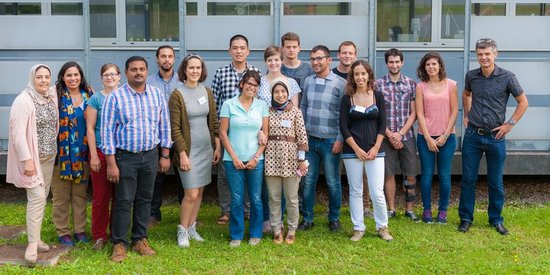Summer school "Microalgae and shellfish ecology in coastal areas"

From 1 to 4 September 2015, 16 students (doctoral, post-doctoral or master 2) were selected and gathered around international experts on the ecology of microalgae and molluscs in coastal areas.
THE PARTICIPANTS
No less than 12 different nationalities for these 16 students, 3 of whom are currently studying in Nantes. They come from horizons as varied as Tunisia, Morocco, Indonesia, Germany, Italy, Belarus, Austria, China, Scotland, Portugal, India and France.
The speakers came from Portugal, Denmark, Canada, France, Spain and the USA. Thanks to Lourenço RIBEIRO, Michaël KÜHL, Cédric HUBAS, André MALLET, Nicolas CHOMERAT, Santiago FRAGA, Philippe SOUDANT, Patricia TESTER, Romain GASTINEAU, Sébastien LEFEBVRE, Véronique SECHET, Philipp HESS, Bruno JESUS, Vona MELEDER, Laurent BARILLE, Priscilla DECOTTIGNIES and Bruno COGNIE.
THE PROGRAM
The mornings were devoted to theoretical lessons, while the afternoons allowed to introduce the students to advanced techniques thanks to practical laboratory work. A field trip on the last day allowed them to test their new knowledge in real conditions!
Theoretical courses at IFREMER
Practical work in the MMS labs
Practical work in the MMS labs
Practical Fieldwork
Practical Fieldwork
WHAT STUDENT THOUGHT ABOUT IT :
Scientific content: 8,6 / 10
Organization: 9 / 10
Correspond with objectives : 8,3 / 10
All confirm that the summer school has been useful in developing their professional network.
All of them confirm that the scientific content and techniques learned will be useful in their future studies, in particular :
- spatt sampling, HPLC, culturing techniques
- Surely the Coulter Counter for following cell culture growth and maybe the windows screen for sampling microalgae
- Techniques d'analyse des Biotoxines Marines / Culture des espèces phytoplanctoniques.
- the benthic HABs techniques and scientific knowledge is very useful to me.
- I hope to use my new knowledge about photobioreactors in my PhD to do some growth studies more quickly.
- Artificial substrate for sampling benthic microalgae / Passive sampling of phycotoxins (SPATT) / Taxonomic identification with thecal plates / Use of the Coulter counter
- Potentially solid phase passive sampling for toxins
- There are many parts that could be useful for my future science studies. First, technique sampling method from Patricia Tester about dinoflagellate can used too for diatom sampling within need longer time than dino. Then, from Romain Gastineau about diatom spesies which is can produce specific pigment and whole of aquaculture. Then from Bruno Jesus and Vona about prymary productivity of diatom measuring technique and pigment analysis.
- Sampling techniques used for the harmful benthic dinoflagellates, SPATT bag analysis,HPLC pigment analysis
- Pigment analysis / Sampling of microphyobenthic biofilms / Microscopic analysis
What they prefered :
- Good group size (not too many people). No lectures in the afternoon, but practical things. To see all the facilities. Well organized. Good supply with papers, literature (thanks for the benthic dinoflaggelates book) and food :) The oysters were amazing :)
- The fact that the speakers came from all over the world and talked about topics that fit perfectly the subject of my PhD thesis. And the field trip, for sure!
- Aspect organisationnel / Aspect communicatif / Aspect pratique (Workshop) / Echange d'informations, de cultures entre différents pays.
- Everything! The organization, the classes, the availability of all the scientific team, the relationship with the other students and the food :)
- I liked how practical it was, and how many different researchers it involved.
- The hospitality / The organisation and the good documents provided / The practical part and the field trip (it was not restricted to theory).
- Good relevant programme, good balance between lectures and practicals; very qualified and motivated teachers; good timely organization and financial support.
- So many aspects. First, the programme organization was very clear, detail, and, on time. Secondly, the content of subjects are relevant with my field science, and the very important thing that the speaker are really professional, expert, kind, and easy going. I get really a lot of experiences from this program. Lastly, the summer school comittee are very welcome, helpful, and friendly. I also met collegue from various countries so make it possible to build collaboration or link one day.
- Practical sessions and lab visit helped to understand the techniques of sampling for the benthic dianoflagellates
- The proportion of theoretical (presentations) to practival content was good. There was always enough time to network and to discuss projects and ideas. In particular I liked the connection to applied aspects, fx the visit of the oyster farm.
Download Programme.pdf